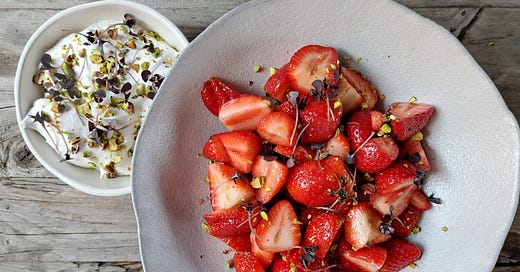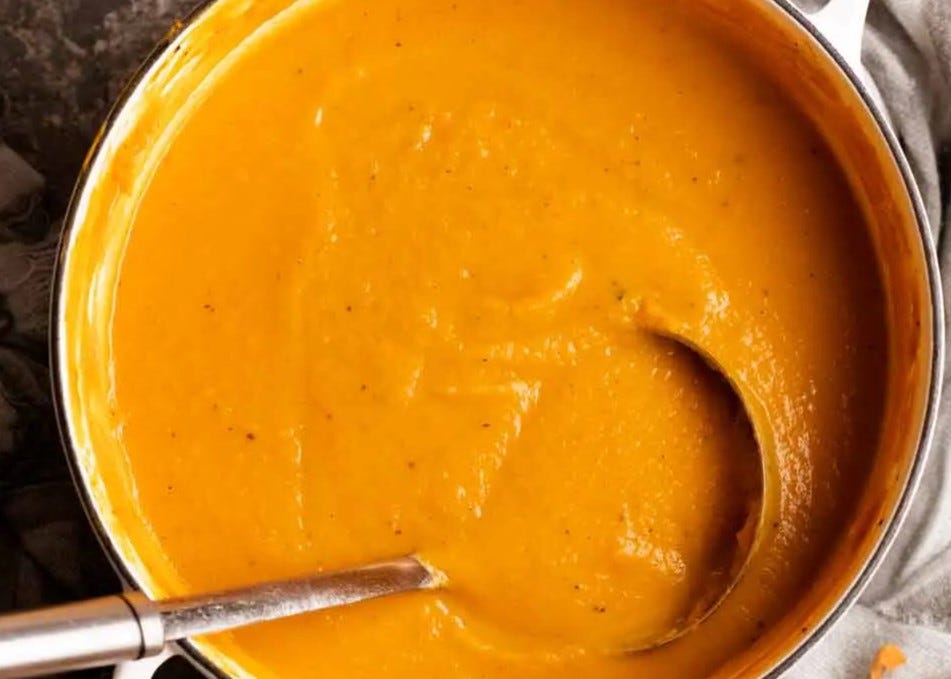There are days of relentless rain, a muddy squelch under foot and the sky is a threatening dark, bluey grey. The air is cold, the clouds are low and the landscape is green again after the long dry summer. I have never been fond of the damp, cold British winters but was comforted by the warmth of hearty rustic stews and classic winter puds. Although much shorter and not quite as cold, signs of Spring shoots are appearing and yet we are very much in the throes of Israel’s winter, the season of orange soup, wild greens and strawberries…
I chuckled when I was first was offered a bowl of ‘orange’ soup known as ‘marak katom’ and mused over the ambiguity of the generically named thick, hearty broth, until I realised it was one of the most popular winter soups prepared in home and commercial kitchens, up and down the country. It is made from a plethora of orange hued seasonal root vegetables including pumpkin, carrots and sweet potato, and not the indigenous citrus fruit, that one might have assumed. ‘Marak katom’ has become a national dish, complemented by the diverse flavoured of herbs, spices and fragrant and creamy stocks that are added to the vegetables, adding a ray of warm sunshine to every mouthful.
This is my recipe for ‘orange’ soup. It is rich and filling on its own, however, to make it even more special, I like to finish it off with a swirl of cream, some sautéed chestnuts or toasted pumpkin seeds and a sprinkling of fresh thyme… it is not complete without a hunk of warm crusty bread or a freshly baked challah…
ingredients:
4 tablespoons of extra virgin olive oil
1 white onion, roughly chopped
1 butternut squash, peeled & roughly chopped
1 large sweet potato, peeled & roughly chopped
3 large carrots, peeled & roughly chopped
1 orange bell pepper, deseeded & roughly chopped
1 teaspoon baharat
a good grating of nutmeg
a good handful of thyme leaves
salt and pepper
500mls - 750mls of good quality vegetable stock or boiling water
double cream, chestnuts or pumpkins seeds, for garnish
method:
place the olive oil in a large saucepan with the onion, carrots & sweet potato, cook on a medium heat for 8-10 minutes, stirring every so often to coat all the vegetables in oil & avoid sticking, add the pumpkin & pepper & cook for a further 10 minutes, stirring to combine, until all the vegetables take on a little colour and begin to soften
add the baharat, nutmeg & thyme & season well with salt & pepper, then add the stock or water, covering all the vegetables & bring to a boil, reduce the heat to a gentle simmer & leave to cook for about 50 minutes, until all the vegetables are soft, remove from the heat & leave to cool slightly
blitz the soup with a hand held blender, leaving chunky bits of vegetable for added texture, serve piping hot with a garnish of your choice and a hunk of bread
The soup freezes really well, but will stay fresh in the refrigerator for up to a week… if it lasts that long!!
Leafy, wild edibles can be found covering the green terrain of rural Galilee at this time of year, as the rains replenish the much needed richness to the earth. Foraging for wild asparagus, hubeza (wild mallow), nettles, jarjir (arugula), wild sage, fennel and spinach is an enjoyable pastime for home cooks and restaurant chefs, who scour fields, common land and foothills for these culinary delights, with soups, stews, salads and pastries in mind, as they meander and gather from the biblical landscape. Workshops and foraging tours take place here, with highly skilled guides meandering though the rich topography, determining the edible from the inedible, and teaching the culinary, medicinal and natural remedies of each plant.
When writing my first book, The Galilean Kitchen I had a fascinating afternoon foraging and cooking with Bedouins, Zada and Ziad from the village of Sallama. They both had a vast knowledge of their natural habitat and a deep understanding of each plant’s culinary and nutritional value. With our basket of rich pickings we made our way back to the kitchen and cooked wild asparagus with lemon and olive oil dressing, sauteed wild fennel tops with lentils, jarjir with cumin and sumac and little bourekas style pastries filled with wild mallow, endive and spring onions. With complementary flavours of fragrant spices and hand picked herbs this was tasty cookery from the ancient bounty.
I regularly make this Jarjir Salad substituting the distinctive peppery leaf, that I have only ever found in markets or street stalls in Arab villages, for wild rocket, which is more widely available. Fresh, tasty and quick to make, this is a great winter salad to accompany any meat, fish or vegetarian stew.
ingredients:
1 bunch jarjir
1 red onion, very finely sliced
1 red pepper & 1 yellow pepper, deseeded & cut into strips
2 heaped teaspoons sumac
1 heaped teaspoon cumin
For the dressing
120 mils extra virgin olive oil
juice of 1 lemon
salt & pepper
method:
slice the jarjir into pieces, large or small & place in a bowl, add the onion & pepper slices & mix well,
mix the olive oil & lemon juice together in a small bowl, season well with salt & pepper
sprinkle the heaped teaspoon of cumin & 1 teaspoon of the sumac over the salad, then pour the dressing over the jarjir, onion & pepper & mix well to combine
transfer to a serving bowl & sprinkle the remaining teaspoon of sumac over the top
Watercress or chicory are also great substitutes for the rocket, or even a combination of all three…
To finish a hearty, warming winter meal with a bowl of plump, ripe strawberries may seem a trifle odd to many of you, who would no doubt avoid a punnet of strawberries at all costs during January or February. However it is strawberry season here and despite the agricultural difficulties in harvesting the berries this year, the lateness of their arrival and the added cost placed upon each punnet, they are locally and organically grown and above all juicy and full of flavour, adding a little brightness to the cold winter months.
They do not appear to be eaten here covered with lashings of cream, glazed in a tart case or cooked down with sugar into jam, they are mostly eaten fresh on breakfast muesli, cut into salads with other fruits, and with lettuce, spinach and a few pomegranate kernels and the ubiquitous citrus dressing, or blitzed into long, healthy smoothies. I like to add a touch of orange zest, a couple of tablespoons of freshly squeezed orange juice and a sprinkling of crushed pistachios and serve with a dollop of sweetened, yet tangy labane, savouring the taste of a Middle Eastern winter whilst yearning for some hot summer sunshine.
Have a happy, peaceful and delicious weekend…









I love this idea of orange soup, flexing to the beiger colours of the season!